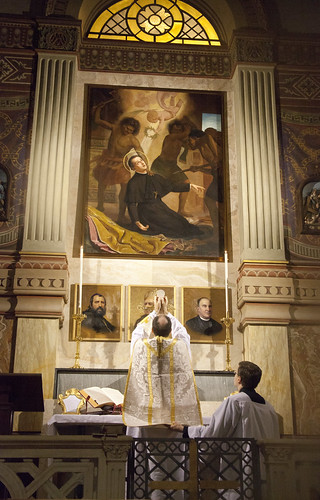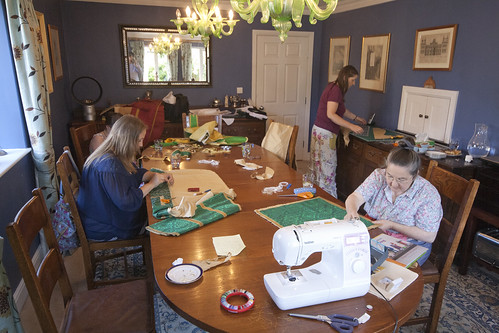Chairman's Blog
Video interview with Fr Anthony Mary F.SS.R
Fr Anthony Mary is one of the older generation of priests of the Sons of the Most Holy Redeemer, the traditional 'Transalpine Redemptorists' based on Papa Stronsay in the Orkneys. They also have an apostolate in Christ Church, New Zealand, where Fr Anthony is currently based.
Support the work of the LMS by becoming an 'Anniversary Supporter'.
Fr Armand de Malleray FSSP on Fr Rolheiser
 |
| Michaelangelo's 'common misconception' |
Not for the first time, Fr Armand de Malleray has written to correct a school-boy error on the part of Fr Ronald Rolheiser in the Catholic Herald. For my money, Fr Rolheiser's articles are the next-worst source of theological error in the dead-wood Catholic media in the UK after those of Mgr Basil Loftus. How a priest of good will could have failed to grasp the fundamental reality of the doctrine of hell as a point of no return is mystifying, but that is what he has done. He even presumes to correct the teaching of our Lord in the Gospels, writing as follows.
And yet, the Gospels can give us that impression. We have, for example, the famous parable of the rich man who ignores the poor man at his doorstep, dies, and ends up in hell, while the poor man, Lazarus, whom he had ignored, is now in heaven, comforted in the bosom of Abraham. From his torment in hell, the rich man asks Abraham to send Lazarus to him with some water, but Abraham replies that there is an unbridgeable gap between heaven and hell and no one can cross from one side to the other. That text, along with Jesus’ warnings about that the doors of the wedding banquet will at a point be irrevocably closed, has led to the common misconception that there is a point of no return, that once in hell, it is too late to repent.
Yes, it has led to that impression: because that is the teaching of both Testaments of Scripture, the Fathers and Doctors, and of the whole Church.
Fr de Malleray's letter is as follows. (Catholic Herald 19th August 2016)
Sir,
Fr Rolheiser deplores "a common misconception...that once in hell it is too late to repent" (August 12). But Francis told mobsters the opposite: "There is still time not to end up in hell, which awaits you if you continue on this world." This would be a bad joke, rather than a fatherly and solemn warning, if hell were not a permanent destination. The Catechism confirms: "To die in mortal sin without repenting and accepting God's merciful love means remaining separated from Him for ever by our own free choice. This state of definitive self-exclusions from communion with God and the blessed is called "hell" " (#1033).
Fr Rolheiser rightly stresses that God's mercy knows no bound, so that if a damned person showed the least sign of contrition, God would responde. But precisely, the Church clearly teaches that once our soul departs from our body, our time to merit -- or demerit -- is ended, so that we cannot become better or worse. Consequently, the soul of a damned person is utterly incapable of regret or love, and it will never want to improve, whatever God may try. How seriously then should we take our time on earth, since it determines our eternity!
Yours faithfully,
Fr Armand de Malleray, FSSP
Warrington, Cheshire
It is mystifying that the Catholic Herald continues to give Rolheiser a platform. Letters correcting his fundamental errors are published a few times a year, but have no effect on him, no dount in part because it is a syndicated column which appears in a number of Catholic publications, and can be read on Rolheiser's website. Does that make it cheaper than a specially commissioned article, I wonder?
Support the work of the LMS by becoming an 'Anniversary Supporter'.
Islamic terrorism: What can we do?
Here, there is something which can be contributed by people who still believe in something, something wholesome and historically rooted. Self-doubt and self-flagellation, even when offered by Christians, has nothing to offer the West; these are things already widespread in our societies. What we can offer is something substantive: that life, beauty, and God are real and have value, are worth something, and can give shape, discipline, and meaning to our lives. If Westerners really believed these things, and set themselves in their lives to live accordingly, then the Islamists would not be confronting such an easy and open target.
Support the work of the LMS by becoming an 'Anniversary Supporter'.
Walsingham Pilgrimage preparations
I've just ordered 80 copies of the LMS Pilgrims' Booklet for the LMS Walsingham Pilgrimage.
If you're now coming, you are missing out! But we'll put up some reports on social media as we go along.
Support the work of the LMS by becoming an 'Anniversary Supporter'.
New Mass of Ages available
 The autumn 2016 edition is now available in which we publish part of the talk given to the AGM by Archbishop Thomas Gullickson, Apostolic Nuncio to Switzerland and Lichtenstein. Speaking on the subject ‘The persecution of the Church’, Archbishop Gullickson said:
The autumn 2016 edition is now available in which we publish part of the talk given to the AGM by Archbishop Thomas Gullickson, Apostolic Nuncio to Switzerland and Lichtenstein. Speaking on the subject ‘The persecution of the Church’, Archbishop Gullickson said:
Support the work of the LMS by becoming an 'Anniversary Supporter'.
Feminisation in the 1960s: the policy aspect, and the way out
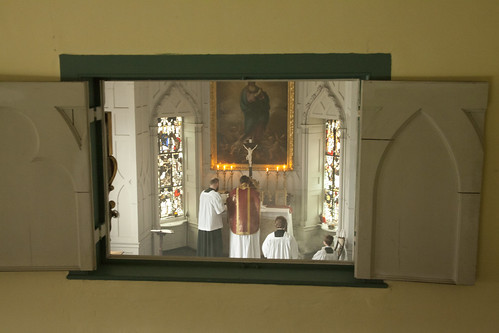 |
| Mass in the private chapel of the historic Catholic house, Milton Manor. |
I've been writing about Callum Brown's thesis that discourse about religion became feminised around 1800. What he means is that, by contrast with the two centuries before that date, from 1800 onwards not only were the dominant exemplars of piety women (in obituaries, for example); not only were men regarded as in need of conversion in a way women were not (the vices of men were addressed at length, those of women little or not at all); but the very idea of religiosity was closely bound up with the idea of feminity. To be feminine, women needed to be religious. To be religious, even men had to become somewhat feminised.
One little straw in the wind was the way angels are represented. Before 1800 they look masculine; afterwards, they look feminine. Female angels, of course, are with us still.
Brown's thesis about the 1960s is that, after a 'final blast of feminisation', religiosity in the 1950s was uniquely vulnerable to a reassessment of what it meant to be a woman, in the 1960s. This duly took place in the context of Feminism. Without the support of women, religious practice collapsed, across all Christian denomenations, in the 1960s and 1970s.
I think there is a good deal of truth in this, but we need think also about the changes going on inside the churches at this time. Within Anglicanism the campaign for female ordination was already gathering pace. A female minister had been ordained in Hong Kong in 1944; rules were changed officially there in 1971, and in the USA in the course of the 1970s; other provinces followed. In the 1988 'Crockford's Preface' which led to his tragic suicide, Gareth Bennet set out how the organisational machinery of the Church of England had been seized by liberals in the 1960s. A world-wide theological crisis was taking place in Anglicanism and, of course, in the Catholic Church as well.
There is a good deal more to this revolution than feminisation, and the broader theological changes certainly contributed to destabilisation of the major denomenations, and this on its own explains a good deal. From the point of view just the factor of feminisation, however, taking that as the major sociological factor at work, the question is how liberalisation of theology and liturgy interacted with it.
This is important because the standard response, from liberals, to the observation that the liturgical reform and other changes from the late 1950s to the 1970s coincided with a staggering collapse of statistical indicators of Church life, is that it was a coincidence, with the loss of congregations and so on flowing from 'sociological factors'. Furthermore, liberals claim that the losses would have been even greater if their reforms had not happened.
It is these claims which need to be assessed. Contrary to the liberal contention, the liberalisation of Christianity did nothing either to mitigate feminisation, nor its disastrous effect, in conjunction with ideological Feminism, on religious practice.
On the first point, from an institutional point of view the effort to 'include' women had the result that the role of men in religion was further undermined. It seemed to the liberals that it was silly for a congregation dominated, numerically and morally, by women, to be served by an exclusively (or at least overwhelmingly) male caste of ordained ministers, church wardens, vergers and so on. The fact that the liberals drew this perverse conclusion from the acknowledged facts - men were increasingly few in informal leadership roles in the religious sphere, and therefore, instead of doing anything to address that as a problem, it should be made infinitely worse by replacing men, in whole or part, in formal leadership roles as well - suggests that they believed the narrative of men as heathens, who could only be saved by the gentle but firm intervention of a 'good woman'.
On the second point, liberals often say that their efforts to facilitate formalised female leadership in the Church is an attempt to make peace with Feminism, which says that women should not be excluded from such roles. This ignores the more fundamental threat posed by Feminism to 1950s spirituality: it's undermining of the idea that to be a woman, to be feminine, is to be religious, along with being romantic and domestic. 1950s domesticity collapsed under the feminist attack, and female religiosity went with it. Letting women take over various parish roles, letting them serve and read the readings and even letting them be ordained, doesn't do anything to address this fundamental problem. In neither strengthens resistance to the feminist attack on the feminised conception of religiosity, nor does it replace that conception with an alternative not so vulnerable to this attack.
Tell your non-religious feminist friends that, really, your local church is not a patriarchal fossil, and, in the unlikely event that they believe you, they will say: well, ok, but why would anyone actually want to go there? Once upon a time, women understood going to church as part of their self-understanding as women, but that is a model of femininity we have rejected. So tell us again: why should we go to church?
The withered stump of the major churches left after the 1960s were and are, for these reasons, even more feminised than the highly feminised churches of the 1950s, but unlike in the 1950s, this feminisation isn't paying any dividends. The lack of men is still, perversly, seen as a reason to focus even more on 'not losing women', and no doubt liberals will go on making this inference until the last male has left and slammed the door behind him. Male vices and female virtues still make the running in preaching. Female models of piety are still still privileged over male ones. But the meaning of feminity has, in the meantime, changed. Instead of being a somewhat passive, domesticating, unifying force, the official stance of the churches has given a stamp of approval to Feminism as an ideology. So while you'll find old-fashioned girls in congregations, the newly available leadership positions are generally given to women who are not only more assertive (which may be a welcome contrast to the 1950s model of what a woman should be like), but who are also imbued with a set of beliefs and attitudes radically incompatible with orthodox Christianity. These women have a very powerful effect on the more 'old fashioned' men who have been inculcated with the theory of the natural superiority of women, which I have described here. Middle-aged celibate male clerics, in particular, sometimes find even the less formidible ones quite terrifying. Boys and young men want nothing to do with them. The women in leadership positions themselves, of course, are sometimes accused of having a power trip. This may be true in some cases; I am sure most are motivated by a concern to serve the Church as they are officially invited to do. The problem is, it makes little difference.
Callum Brown himself falls prey to the thinking I've mentioned when he says that, while in the 1960s congregations lost men faster than they lost women, while the gender imbalance was getting worse, the problem the churches faced was the loss of women, not the loss of men. But this is a paradox. 1950s men had a reason to humour their wives or mothers by going to church because it was widely believed that what women wanted - religiosity - represented hearth and home, respectability and domestic happiness. When femininity became detached from all these other things, men, like the secular feminists I've just mentioned, had to make an independant assessment of religion. They needed a reason to go, to associate themselves with this churchy thing. What they saw was an ecclesial environment dominated by femininity, a situation getting even worse as the decades passed. Not only is this in the normal way not an especially attractive option, but for young men it is actually a threat to their masculinity.
The one thing which had resisted feminisation, because it had remained unchanged from an era before this process had begun, was the liturgy. This, of course, ceased to be the case in the course of the 1960s, in the Catholic Church, and in the 1970s in the Church of England. In the Catholic context, it is this which offers us a way back, because the traditional liturgy and its spirituality has the ability to reach the deep tradition, and to bring us back into contact with that deep tradition. I mean the tradition before and above the silly nonsense of Victorian Puritanism, Romantisism, and sentimentality, of angels with bosoms and the temperance movement, of men being told to be women and women being told to be passive and irrational, and of religion as an assertion of respectability. The Traditional Mass and the spirituality it sustains is that of the Fathers and Doctors of the Church, of the catacombs and the Tyburn martyrs, of the Gospels, the Book of Revelation, the Psalter, and the tradition of chant stretching back to the Temple. Go into a church where the Traditional Mass is being celebrated on a Sunday, and look at the gender balance for yourself. These are the truths that lie too deep for taint.
See the FIUV Position Paper on the Traditional Mass and the Evangelisation of Men.
Support the work of the LMS by becoming an 'Anniversary Supporter'.
Guild of St Clare Vestment mending day
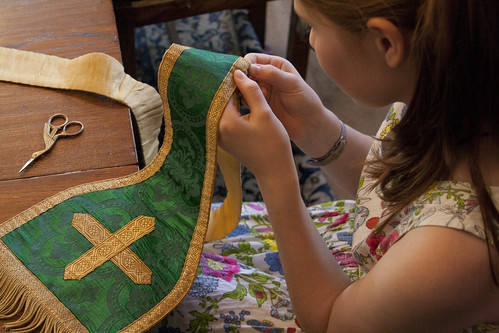 |
| A young Guild member hand-sews a new linging on a maniple. This, like most the days' tasks, simply cannot be done by machine. |
The Oxford branch of the Guild of St Clare held a Vestment mending session on Saturday, an example of the kind of work which they can do to support the liturgy.
 |
| Doing the same work on the matching Chalice veil. |
There were a number of vestments from the Norbertine Priory in Chelmsford, and an altar frontal from SS Gregory & Augustine in Oxford. The vestments are not of especially high value: it would not be worth spending vast sums on professional restorers. But they need careful attention by people with a variety of skills and an understanding of how vestments work, and are used, if these very decent vestments are to return to use.
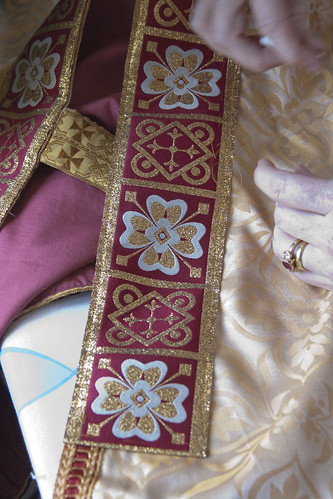 |
| Working on a white cope. |
For example, one green Low Mass set's lining was completely worn out, and was replaced. In another case, a high-quality, silk lining fabric was intact but worn out at the edge, so it has been edged with another, appropriate material, at minimal cost in materials.
The ladies of the Guild were able to combine their experience and skills on Saturday afternoon to made a big inroad to the pile of worn out vestments which Fr Stephen Morrison OPraem found in the Chelmsford sacristy, as a taster of the kind of work for which the Guild was established. The Guild charges for the cost of fabric and a small amount per hour, to subsidise members' training.
The Guild is affiliated to the Latin Mass Society.
Support the work of the LMS by becoming an 'Anniversary Supporter'.
Was religion feminised in the 19th century? Part 4: what happened in the 1960s
 |
| St Anne, Our Lady, and the Infant Jesus: from the Walker Art Gallery |
In the first post of this series I set out the sociologist Callum Brown's account of how piety came to be seen as female by evangelicals in the 19th century; in the second post I gave an explanation of how this came about: the influence of Romanticism. In the third post I made certain caveats about how British Catholicism fits into Brown's picture. Now I want to address the million-dollar question: why did religious practice collapse in the 1960s?
Callum Brown is a little short of explicit explanation, beyond saying that the 'discourse' changed, but one thing he makes clear is that Evangelical religious discourse was hugely dependant on women by the end of the 1950s. The dependance had started long before, with women picured as the pious ones, by contrast with 'heathen' men, but the situation was particularly acute in the post-war religious revival. For example, popular boys' magazines, which had started with a strong religious element, dropped this in the 1930s, just as girls' and women's magazines (if they survived at all) dropped explicit religious content in the 1960s.
What the discourse was about, was feminity and respectability. This was an era, as I've noted in an earlier post in this series, that affiliation was more importance than practice: thus 'rites of passage' moments are marked with religious ceremony (baptism and marriage etc.); a higher proportion of children were sent to Sunday school than adults went to church.
In this situation, a loss of concern for respectability and the opinion of others, particularly of the older generation, would have a far greater effect than it would have on a discourse focused on battling sin in a hostile world, which is more what it looked like in the early 19th century. Even that more robust version of the discourse, if predicated disproportionately on women, would be vulnerable to an alternative source of female self-understanding, alternative, that is, to the idea that the woman in the house was holding things together morally. Thus, if women had something else to undertand themselves as being about, such as the seeking of new experiences and seeking value in the world of work, and if that seemed more attractive, then the whole house of cards would tumble down.
Now, in the 1960s there was indeed a rejection of the notion of respectability, of the idea that one's worth was dependent in some important degree on the opinions of the older generation: thanks to the numbers and financial resources of the young in the context of the baby-boom and the prosperity of the 1960s. There was also a ideology abroad, which said that women could attain self-worth not by keeping house, but by joining the labour market.
The last factor, feminism, was not, contrary to Brown's naive contention, a miraculous, spontaneous effusion from ordinary women; it was the goal of a long campaign by elite women. As Carolyn Graglia (Domestic Tranquility) has set out, for decades feminists had waged a ferocious campaign of villification of housewives. Housewives are described by these charming ladies as mentally retarded, lacking in imagination and creativity, and as no better than prostitutes, for failing to do paid work outside the home.
Graglia also illustrates other important factors, which she experienced personally as a young woman in the 1960s. First, since the 1930s female education had been modelled on the education of boys, which meant that what she was actually trained to be able to do was not running a house, but working in an office. All her work habits and skills were directed towards office-type work. Second, the collapse of tightly-knit extended families (often in the context of ethnic ghettos in the USA), because of suburbanisation and (especially in the UK) slum clearance, deprived women starting families of the practical help of their own mothers and other older family members and friends. Third, this era saw (partly as a consequence of the last point) the rise of books by supposedly qualified people on child-rearing, the take-home message of which was 'You're doing it all wrong!' These promoted the idea that your children are only really safe with paid, professional, carers.
All in all, young women in the late 1950s onwards were bombarded with the idea, and to an extent the reality, that they couldn't cope in the home, trying to cook and sew and look after children: they were much more comfortable, and much more valued by the elite women of the day, working in an office.
Another factor, which I've already dealt with, is that what Feminism was opposing was a highly problematic Romantic conception of femininity.
Feminism's ideological push would not have been successful without these other factors: indeed, it had not been successful in earlier decades. It found itself pushing at an open door in the 1960s because of the sudden disapearance of opposing forces, above all the influence and support of the older generation.
These factors led to the triumph of feminism, and that led to the collapse of Brown's Evangelical discourse as a dominating feature of British society and culture. The Catholic Church was also affected by this, but I need to say something about how the Church's own changes of policy interacted with these factors.
One satisfying thing about this explanation is that it explains why church attendance fell in the 1960s and 1970s at exactly the same time as membership of book clubs, sewing circles, membership organisations of all kinds, and neighbours chatting over the garden fence, described by Robert Putnam in Bowling Alone, which I have discussed here. All these things happened together, because they were the consequences of the factors, themselves linked, of suburbanisation (with its implications for the loss of leisure to commutting) and women adopting a new self-understanding and joining the labour market. They no longer saw themselves as primarily home-makers, with the time and the vocation to connect local communities, and given how religiosity was understood at that moment, this meant that they ipso facto gave up their role of corralling the children and menfolk into church on a Sunday.
Support the work of the LMS by becoming an 'Anniversary Supporter'.
Feminisation of the liturgy: letter in the Universe
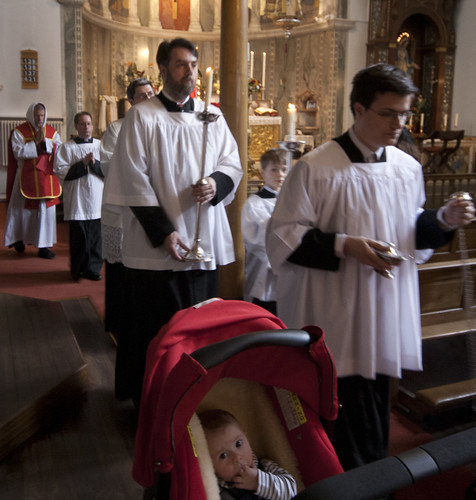 |
| A Traditional Sung Mass in Our Lady of the Assumption, Warwick Street, celebrated by Prior Cassian Folsom of Norcia. |
This weekend the Catholic Universe is publishing a letter by me. The have illustrated it with a charming photograph of altar boys - not a photo of mine, I don't know where they got it.
The article which occasioned my letter noted that the parents of 'poor white boys' did not tend to turn up to parents' meetings at schools. This is one sympton of a truly massive problem. Belinda Brown gives a talk about the effect on boys' interest in eduction of one-parent families here.
I read with interest Leon Spence's article on the education system's failure with regard to poor white boys ('Society has to address problem of poor white boys' education', 22nd July). While implicitly blaming parents, however, he fails to note the effect on boys in general of the feminisation of both the curriculum, and of the teaching profession itself. A recent report by the OECD notes that boys do better in anonymous tests: consciously or not, teachers discriminate against them.
The Church faces a similar problem. The recent British Social Attitudes survey's sample of 2,000 people did not contain a single young man (18-25) who attended Catholic worship at least once a week, and revealed that, overall, men make up only a third of Catholic congregations.
Much has been written of the 'feminisation' of Catholic liturgy; the disappearance of altar boys is one obvious example. Other aspects are more subtle, like the emphasis on spontaneity, over-emotional 'signs of peace', and a general lack of mystery and reverence. By contrast, the Traditional Latin Mass attracts both sexes in roughly equal proportions.
Sociologists such as Mary Douglas and Anthony Archer also noted how the reformed, English Mass appealed more to middle class Catholics, by moving away from ritual towards a verbal form of participation.
The working class fathers of families, who were once the backbone of Catholicism in the UK, have thus been hit with a double whammy. It is time the Church stopped being part of the problem of disaffected poor boys and men, and became part of the solution.
Yours faithfully,
Joseph Shaw
Chairman
The Latin Mass Society
Support the work of the LMS by becoming an 'Anniversary Supporter'.
Was religion feminised in the 19th century? Part 3: the Catholic experience
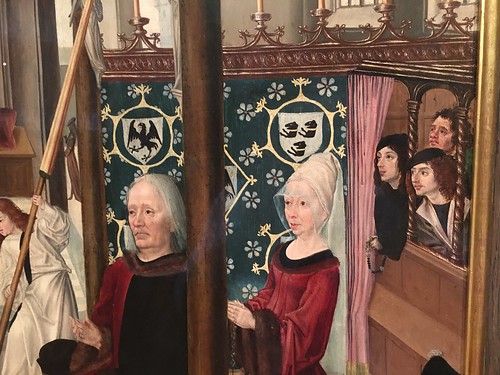 |
| The donors of a fabulous Medieval triptych in the Walker Art Gallery in Liverpool, which the SCT Summer School visited, attend Mass, as presented on the outside of the triptych doors. They are in a private chapel, but the curtains at the back have been pushed aside by young men eager to witness the Consecration. Late 15th century. |
In the first post of this series I set out the sociologist Callum Brown's account of how piety came to be seen as female by evangelicals in the 19th century; in the second post I gave an explanation of how this came about: the influence of Romanticism. Under this influence, a model of piety was developed which was feminine. Women were held up as models (dominating pious obituaries, for example); men were problems - the obituaries even of clergy emphasised their struggles with sin.
The identification of the feminine with the pious is exactly the problem which Leo Podles talks about in a Catholic context, but in his book he blames 'Bridal Mysticism', the identification of the individual Christian, as opposed to the Church, with the 'bride of Christ', in the High Middle Ages (starting with St Bernard). In a more recent talk, he lays stress, instead, on the role of the clergy as the 'fun police', referring to opposition to dancing by St Jean Vianney and St Charles Borromeo. In either case, he gives a bit of anecdotal evidence for women being regarded as more pious than men in the later Middle Ages, and more frequent church-goers. He draws a line between this and the lack of men in church today, bypassing the Reformation, Romanticism, and the changes of the 1960s and '70s.
As I have said before on this blog, Podles' evidence for a loss of men from the Church in the Middle Ages and Early Modern period is fairly thin, and even in the 19th century it is patchy. You do find people talking about female piety, but the discourse of 'female depravity' can be also found in the later Middle Ages (it is criticised by Chaucer's Wife of Bath), as well as 'masculine depravity': those medieval preachers criticised everyone. Bridal Mysticism was a significant, but not a dominating, spiritual school through this period. And it is clearly a mistake to imagine that later events and movements made no difference.
By contrast, Callum Brown thinks of the major shift as taking place around 1800. Brown tells us that Catholic sources are similar to Evagelical ones in their presentation of the sexes in relation to religion. Since Brown is talking about the UK, it is inevitable that Catholics would be influenced by the majority religion and culture, and the invasion of Catholic art and spirituality by the sentimentality of the early Victorian period is impossible to miss. However, the bigger picture of the development of Catholic thinking doesn't fit the pattern Brown offers. I'm open to correction, but I don't really see the stark contrast between 18th and 19th century Catholic spirituality which Brown describes in relation to Evangelical spirituality.
On the subject of Podles' 'fun police', this has a strong parallel with the Puritanism of Evangelical religion both before and after Brown's 1800 paradigm shift. Brown would say, presumably, that this only becomes part of feminised conception of religion in the context of other parts of the picture. This is surely correct. If a puritanical attitude to 'fun' is combined with an emphasis on male leadership and the depravity of women, you don't have a feminised understanding of religion, you have a very tough, masculine one - along monastic or even military lines - and that's exactly what we see among British evangelicals before 1800. That's not to say that it is really attractive to men: if the lack of fun is too restrictive there can be a backlash. Perhaps Podles is correct that men in France before the Revolution and Spain before 1936 were resentful of kill-joy clergy who were personally morally slack (although there were surely other factors), but this looks like an separate issue from the issue of feminisation.
In any case, it is clear enough that Catholic societies were never remotely as puritanical as Puritan societies. Against St Jean Vianney (operating in a church still influenced by Jansenism) and St Charles Borromeo (in a society much in need of moral reform), there are the fun-loving saints, like St Philip Neri and St John Bosco. Bosco used to quote Neri:
Let young men be cheerful, and indulge in the recreations proper to their age, provided they keep out of the way of sin.
One bit of hard evidence on feminisation, from the United States, is from the census of 1936, which is quoted by Podles himself:
[I]n Eastern Orthodoxy the ratio of women to men is .75-.99 to one; Roman Catholics, 1.09 to one; Lutherans, 1.04-1.23 to one; Mennonites, 1.14-1.16 to one; Friends [Quakers], 1.25 to one; Presbyterians, 1.34 to one; Episcopalians, 1.37 to one; Unitarians, 1.40 to one; Methodists, 1.33-1.47 to one; Baptists, 1.35 to one; Assembly of God, 1.71 to one; Pentecostalists, 1.71-2.09 to one; Christian Scientists, 3.19 to one.
Another, which is anecdotal but surely reliable, is Mgr Hugh Benson, writing in his autobiographical Confessions of a Convert which was published in 1913, and directly addresses the accusation that the Catholic Church put off men.
[A]mongst Catholics emotionalism and even strong sentiment is considerably discouraged, and … the heart of religion is thought rather to reside in the adherence and obedience of the will. The result is, of course, that persons of a comparatively undevout nature will, as Catholics, continue to practice their religion, and sometimes, in ungenerous characters, only the barest minimum of their obligations; whereas as Anglicans they would give it up altogether.
...
There is no “alienation of the men” [in the Catholic Church]; on the contrary, in this country, as also in Italy and France, I am continually astonished by the extraordinary predominance of the male sex over the female in attendance at Mass and in the practice of private prayers in our churches. At a recent casual occasion, upon my remarking to the parish-priest of a suburban church of this phenomenon, he told me that on the previous evening he had happened to count the congregation from the west gallery and that the proportion of men to women had been about as two to one. This, of course, was something of an exceptional illustration of my point.
I think it is very likely that feminisation grew in the Catholic Church in Britain in the half century after Mgr Benson wrote, especially in the 1950s, a time when sentimental Catholic devotional art, to use just one measure, certainly thrived. Brown describes a 'final blast of feminisation' in the Church of England, which saw a rocketing ratio of female to male candidates for confirmation, for example. But I would contend that this feminisation was less intrinsic to the Catholic offering, less deeply rooted.
The next issue to tackle is what exactly happened in the 1960s. Brown tells us that a highly feminised religious discourse, which is to say a set of social sanctions, expectations, and self-understandings linking religiosity to the feminine realm, suddenly collapsed in the 1960s, alongside religious practice. Why?
Support the work of the LMS by becoming an 'Anniversary Supporter'.

